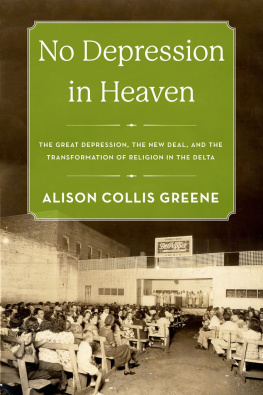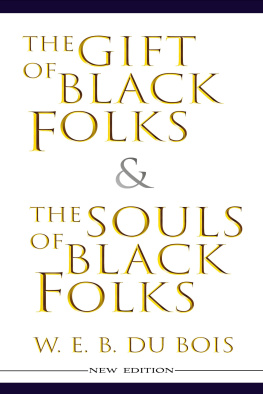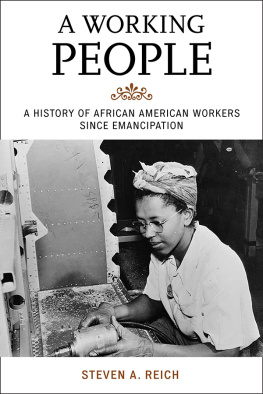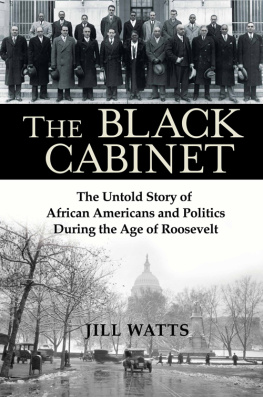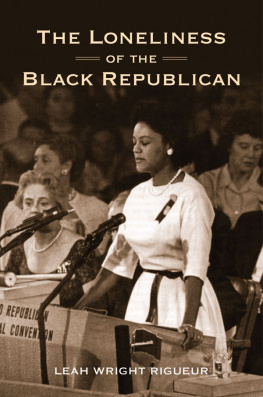BLACK CULTURE AND THE NEW DEAL

2009 THE UNIVERSITY OF NORTH CAROLINA PRESS
All rights reserved
Designed by Kim Bryant
Set in Arnhem by Tseng Information Systems, Inc.
Manufactured in the United States of America
The paper in this book meets the guidelines for permanence and durability of the Committee on Production Guidelines for Book Longevity of the Council on Library Resources.
The University of North Carolina Press has been a member of the Green Press Initiative since 2003.
Library of Congress Cataloging-in-Publication Data
Sklaroff, Lauren Rebecca.
Black culture and the New Deal : the quest for civil
rights in the Roosevelt era / Lauren Rebecca Sklaroff.
p. cm.
Includes bibliographical references and index.
ISBN 978-0-8078-3312-4 (cloth : alk. paper)
1. African AmericansIntellectual life20th century.
2. African AmericansCivil rightsHistory20th
century. 3. New Deal, 19331939. 4. United States
Politics and government19331945. 5. United
StatesRace relationsPolitical aspectsHistory
20th century. 6. Social changeUnited States
History20th century. 7. United StatesCultural
policyHistory20th century. 8. Art and state
United StatesHistory20th century. I. Title.
E185.6.S62 2009
323.1196073dc22
2009018548
Earlier versions of parts of this book were previously
published: Sklaroff, Lauren R., Constructing G.I. Joe
Louis: Cultural Solutions to the Negro Problem during
World War II, Journal of American History 89, no. 3
(2002): 95883; and Sklaroff, Lauren R., Variety for the
Servicemen: The Jubilee Radio Show and the Paradox
of Racializing Radio during World War II, American
Quarterly 56, no. 4 (2004): 94573, The Johns Hopkins
University Press. Used with permission.
13 12 11 10 09 5 4 3 2 1
for JIM
with MUCH LOVE
CONTENTS

ILLUSTRATIONS
Hallie Flanagan, national director of the FTP
New York City FTP Negro Unit theater and stage workers
Clarence Muse, Los Angeles FTP Negro Unit director
Scene from Walk Together, Chillun
Cast of Swing Mikado
Four Jitterbugs from Swing Mikado
Eleanor Roosevelt and Colonel Harrington
Jitterbugs dance in the aisle at New York Swing Mikado
Joe Louis demonstrates boxing technique to soldiers
Elmer Davis, director of the OWI
Joe Louis and his fellow soldiers
Joe Louis boxes Elza Thompson
Enlistment poster featuring Joe Louis
Staff of the AFRS (c. 1942)
Tom Lewis, commander of the AFRS
Black infantrymen in training, Fort Belvoir
Major Mann Holiner, producer of Jubilee
Ernest Whitman, Lena Horne, and Eddie Green
Lena Horne in Stormy Weather (1943)
Bing Crosby and Eddie Green
Hattie McDaniel and Mary McLeod Bethune
Ethel Waters in Cabin in the Sky (1943)
Lena Horne and Bill Robinson in Stormy Weather (1943)
Multiethnic platoon in Bataan (1943)
Scene from Sahara (1943) featuring Rex Ingram
Cast of Lifeboat (1944) featuring Canada Lee
ACKNOWLEDGMENTS
In his classic, Charlottes Web, E. B. White writes, It is not often that someone comes along who is a true friend and a good writer (184). I am unusually fortunate to have so many people in my life that fit this description. While a graduate student at the University of Virginia, I was lucky enough to have Nelson Lichtenstein as an adviser; the confidence Nelson had in my work, even at its earliest stages, continues to amaze me. I will never be able to thank him enough for always being my advocate and for his willingness to read everything I have sent his way.
In her exceptional scholarship and strong convictions, Grace Hale has also served as an important role model. I thank Grace for her honesty and for always urging me to pursue my interestsno matter how unconventional. Many others at Virginia provided valuable guidance, including Ed Ayers, Cindy Aron, Brian Owensby, Chuck McCurdy, and Eric Lott. Maire Murphy helped me navigate the often rough terrain of graduate school; years after we both have left Charlottesville, Maire remains a great friend who affirms my choices and is always willing to listen.
I had the wonderful opportunity to hold a Smithsonian predoctoral fellowship at the National Museum of American History and to work with many talented scholars. Charlie McGovern believed in this project in its most abstract iteration and guided me to many invaluable resources. A terrific mentor with an encyclopedic mind for all things popular culture, Charlie had an immeasurable impact on this project. I appreciate Pete Daniel for creating and sustaining an intellectually vibrant community at the Smithsonian and the many fellows who enlightened me through their scholarship and reassured me in times of frustration. In addition, I thank Fath Ruffins for her reliable advice and her astute sense of perspective.
I am grateful to the Department of History and Art History at George Mason University, where I held the J. N. G. Finley postdoctoral fellowship in 20034. At George Mason, I received remarkable guidance from the late Roy Rosenzweig, who, despite all of own his projects, always found time to read my work and provide suggestions. I also had the privilege of the late Larry Levines insights; Larry read the manuscript in its entirety, and his extensive comments forced me to think very differently about the meaning of black culture.
I would like to thank editors Joanne Meyerowitz, of the Journal of American History, and Lucy Maddox and Marita Sturken, of American Quarterly, for their interest in my research and for placing earlier versions of portions of this work in such exciting forums so early in my professional career. Kathy Newman, George Roeder, and anonymous readers provided close, thoughtful readings of the manuscripts of my articles that informed my thinking throughout the book. This scholarship has been presented at conferences of the American Historical Association and the Organization of American Historians, and I appreciate Gary Gerstle, Lewis Erenberg, John Gennari, and Jonathan Holloway for their perspectives.
Most of my research was conducted in Washington, D.C., and I would like to thank the helpful staffs at the National Archives, the Library of Congress, the Archives Center at the National Museum of American History, and the Moorland-Spingarn Research Center at Howard University. In addition, I am grateful for the aid of archivists at the Franklin D. Roosevelt Library, which granted me the Eichelberger-Linzer Research Fellowship.
Since January of 2005, Columbia, South Carolina, has been my home, and the Department of History at the University of South Carolina has been exceptionally kind and welcoming. Christine Ames, Ronald Atkinson, Marjorie Spruill, and Connie Schultz made my move down south and the transition to a new job seem much less overwhelming. While serving as chair of the history department, Patrick Maney always had my best interest at heart, and I thank him for his enthusiasm toward my research. Our current chair, Lacy Ford, generously provided additional resources toward completion of this book. I am much obliged to Mark Smith, who has helped me stay on course, with an unflagging confidence in my scholarship and academic potential. I thank Pat Sullivan for all of her great advice on publishing this book and for challenging me to always reevaluate the meaning of the black freedom struggle. In addition, Dan Carter extended the great gift of his wisdom and friendship while cheerfully agreeing to read this manuscripthis suggestions have proved invaluable. Finally, I am so appreciative of Larry Glickman, an amazing colleague, friend, and mentor who offered sharp and constructive comments on my book.


